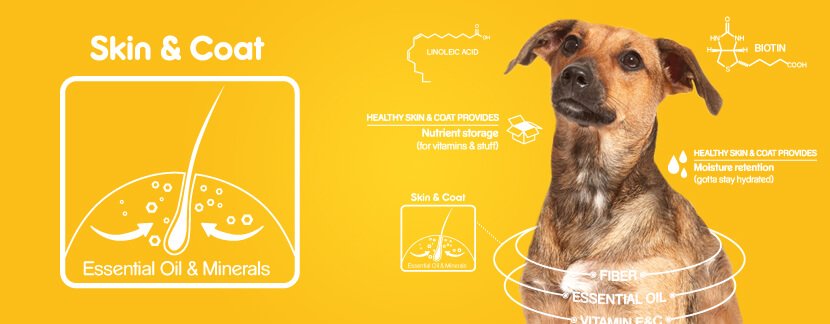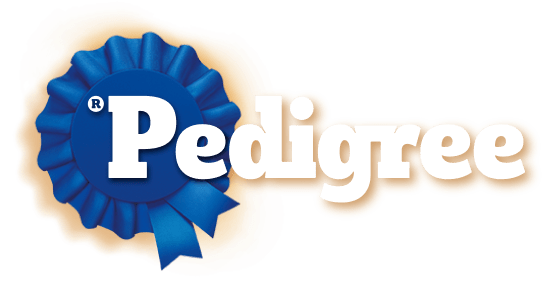Skin & Coat
Your dog's skin & coat are his first line of defense against dirt, the elements, and other nasty things.

Think of all the things your dog digs in, runs through, pounces on, rubs against, and rolls in. They're not exactly clean, are they? And the main barriers between your dog and dirt, the elements, and other nasty things, are his skin and coat. Our dry recipes have been formulated with zinc and leading levels of linoleic acid to help keep your dog's skin and coat healthy and strong. So this soft, supple, and pet-able outside can act like protective armor.
Featured Questions & Answers: Skin & Coat
How often should I give my dog a bath?
Frequency of bathing depends on your dog's breed, activity level, and lifestyle. Most dogs don't need a bath more than once a month. Some dogs tend to be a little greasier or love rolling in mud and other dirty stuff, so they'll need to be bathed more frequently. Remember, bathing your dog too frequently can strip the coat of protective oils and cause skin irritations. If you're not sure about how often you should bathe your dog, ask an experienced groomer or your vet.
Can I use my shampoo when I bathe my dog?
Use only mild shampoo that is specially formulated for dogs. Human soaps and shampoos are formulated for human skin pH and may cause dry, irritated, itchy skin.
How can I get skunk stink out of my dog's fur?
As you now know, skunk oil is nasty and persistent. If your dog has just been sprayed, keep him outside. And put on old clothes before handling him. When you're ready to wash your dog, try to clean only the area that's been sprayed—if you can make that determination. Skunk oil can easily be spread all over the dog, and you will most likely have to give him more than one bath. So save an all-over bath until the second or third washing. When giving your dog a de-skunking bath, use a commercial skunk odor remover, which can be purchased from your local pet specialty store. These are usually very effective. Be sure to follow the directions on the label.
Featured Questions & Answers: Oral Care
I've noticed some bleeding around my dog's gums. What causes that?
Bleeding of the gums is one of the early warning signs of gingivitis, the first stage of periodontal disease. Other signs of this condition are bad breath and reddening and swelling of the gums where they meet the teeth. Gingivitis is reversible with proper care, so take your dog to the vet as soon as possible, and develop a home oral care program that best fits your dog. If left untreated, however, gingivitis can progress to more serious—and non-reversible—forms of periodontal disease.
What's the best way to keep my dog's teeth as clean as possible?
Daily brushing is the most effective way of keeping a dog's teeth clean. Be sure to use a toothbrush that's specially designed for dogs, or you can use a very soft human toothbrush. And never use toothpaste that was developed for humans. Use only doggie toothpaste.
Is it true that gum disease can lead to more serious health problems for dogs?
Yes. If periodontal disease is left untreated, bacteria from your dog's mouth could enter his bloodstream and travel to his heart, lungs, kidneys, and other organs. If you suspect that your dog has gum disease or any problem related to his teeth or gums, take him to the vet for an oral exam.
Digestion
Bellies aren't just for rubbing. They're for absorbing nutrients, too. And that can help dogs absorb more of the healthy things we pack into every kibble.
Featured Questions & Answers: Digestion
I eat a lot of fiber, but does my dog need fiber, too?
Dogs, like humans, can benefit from a diet with appropriate amounts of dietary fiber. Fiber helps with regularity and helps keep the digestive tract healthy. A healthy digestive tract will ensure your dog utilizes more of the nutrients in his food. A high-fiber diet can also help with weight management. That's because the fiber tends to make dogs feel fuller, so they are more satisfied when they've finished eating a meal, instead of feeling hungry. And thanks to fiber, your dog could have stools that are more solid—which makes them easier to clean up.
Why does my dog scoot his rear on the carpet?
That strange-looking behavior is an indication of anal sac disease. With that condition, the dog's anal sacs become impacted and filled with secretion, which is uncomfortable for your dog. He scoots his rear on the carpet in an attempt to unclog the sacs. If this is a persistent problem, consult your vet. A diet that's high in insoluble fiber may also help.
Now that my dog is senior and slowing down, does he still need protein?
Yes. Your older dog may not be as active as he once was, but that doesn't mean protein should be excluded from his diet. It is important for senior dogs to receive an appropriate amount of highly digestible protein to help maintain their muscles, immune system, and other bodily functions to support a long, healthy life. Some signs of protein deficiency include loss of appetite, weight loss, dull coat, lower immunity to disease, and fluid retention.
Immunity
No matter how tough your dog seems to be on the outside, his real strength starts on the inside with a healthy immune system.
Featured Questions and Answers: Immunity
Does my dog need antioxidants in his diet?
Antioxidants, such as vitamins C and E, have been shown to help inhibit cellular damage caused by free radicals. In fact, the scientific research used for Pedigree® Food for Dogs indicates that supplementation of vitamins C and E together, and well above minimum requirements, can provide synergistic benefits to support the effectiveness of a dog's immune system.
How do vaccinations work?
When you have your dog vaccinated, a killed or weakened form of a specific antigen—such as distemper or parvovirus—is introduced into your dog. This stimulates your dog's production of antibodies to fight that antigen if/when it invades your dog's system.
3 results
3 results
